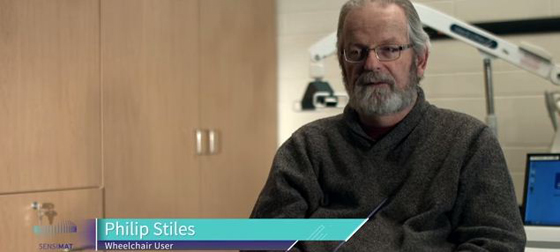
Philip Stiles is one of 86,000 people in Canada with a spinal cord injury. SensiMat aims to ensure he will never develop a pressure ulcer again. (Photo: SensiMat Systems)
Whether at home or the office, we've all had days where we remained sedentary.
You know the feeling. Your shoulders start to tense, your back aches and the pressure from staying seated begins to take a toll. So, you stand up for a quick stretch to loosen your limbs.
But what if you couldn't get out of your chair to reduce this pressure?
Painful sores
For wheelchair users, the pain doesn't stop at slouched shoulders and achy backs. If the issue isn't corrected it can result in localized injuries known as pressure ulcers – painful sores that can dramatically decrease a person's quality of life.
"Soon after I got injured I developed a pressure ulcer and it took me five and a half years to get rid of it," said Philip Stiles, Toronto Rehab patient and wheelchair user. "I didn't get out of bed for two and a half months. It drove me nuts."
Philip is one of over 86,000 people living with spinal cord injury (SCI) in Canada who is wheelchair-bound and prone to developing these ulcers, which are potentially deadly if bacteria or viruses enter the open wound.
Cell phone reminder
A new technology known as
SensiMat, developed by the start-up company SensiMat Systems with the help of a research team at Toronto Rehab, aims to ensure Philip and other wheelchair users don't face this problem again.
SensiMat is a sensor that is placed under a wheelchair cushion to monitor regular movement and recognize an imbalance in pressure distribution. The simple technology is connected to the user's mobile device and will send a text or a phone call to remind them to shift to the right or left if they haven't done so in a while.
Enhanced quality of life
Dr. Milos Popovic, Chair in SCI Research at Toronto Rehab, originally inspired David Mravyan to develop SensiMat. David later created SensiMat Systems around the product, and he co-founded the company together with Will Mann.
"I knew right away that this product had potential. It's a nice, simple technology that can provide an enhanced quality of life for people living with SCI's," said Dr. Popovic. "I was inspired by David and Will's passion and willingness to take a risk to create the product and to try to take it to the market.
Throughout product development, David and Will collaborated closely with Toronto Rehab's Prof. Molly Verrier and Sharon Gabison so that the product, once developed, will meet the needs of the patients who frequently suffer from pressure ulcers.
Dr. Popovic describes SensiMat's return on investment as "incredible," explaining the product can be purchased for a few hundred dollars. He says the price of the product is little compared to the cost of treating a bad pressure sore that can cost the system upwards of $90,000 when the ulcer impacts the person's ability to work.
SensiMat can be beneficial to all wheelchair users, but specifically targets people with new SCI's that don't yet know how to balance their pressure or those experiencing emotional trauma which can affect their movement.
SensiMat Solutions launched a campaign via
indiegogo.com in March 2014 with the goal of raising $15,000 and surpassed that goal in 15 days.
Toronto Rehab will continue its involvement with SensiMat Solutions. The goal is to help SensiMat Solutions company with finalizing the design of the product, and to carry out a pilot trial with SensiMat in preparation for its full product launch.
